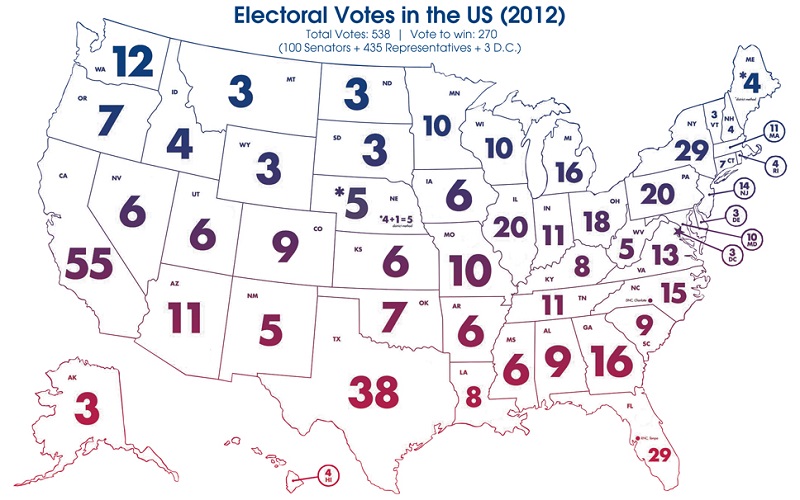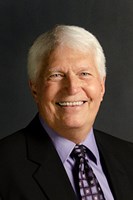

The custom in the United States today is for Electoral College (EC) votes to be awarded state-by-state on a winner-take-all basis. A candidate who wins the popular vote in an individual state gets every one of its electoral votes.
Although we are accustomed to thinking this is the only way it can be done, the method of awarding electoral votes is a matter for each state to decide. For example, two states (Nebraska and Maine) award electoral college votes by congressional district rather than by statewide popular vote. There is no reason for every other state in the nation not to follow suit.
The number of electors in each state is equal to the number of members of Congress to which the state is entitled. Thus there are, in total, 538 electors, corresponding to the 435 members of the House of Representatives, the 100 senators, and, by virtue of the 23rd Amendment, three additional electors from the District of Columbia.
Each member of the House, of course, represents one congressional district, and each of a state’s two senators represents his entire state. The fairest way to award electoral votes would be to award one electoral vote to the winner of each of those congressional districts and the two senatorial votes to the winner of the statewide vote.
The Founders designed the House to be the body that was closest to the people. (At the time of the Founding, each member represented about 30,000 constituents. Today, each House member represents around 700,000 constituents.) This arrangement was to ensure that the voice of the American people, even in less populated and more spread out areas, was heard.
Voters outside major population centers today are virtually disenfranchised by the current arrangement. Voters in eastern Washington, for instance, know full well that the outcome of the electoral college vote will be determined by the vote in the major population centers of Seattle and King County. They know their vote, while it will be counted, is largely symbolic.
But if EC votes are awarded by congressional district, suddenly voters in eastern Washington, whose districts lie wholly outside the state’s urban centers, have a voice and a vote that counts.
This would be true across the country. In California, Romney would have won 13 of the state’s 55 electoral votes, which is certainly better than a shutout and has the additional and more important advantage of letting voters in those 13 congressional districts know that their vote matters as much as the vote of folks in San Francisco and L.A. Romney would have won three of New York’s 29 electoral votes, six out of Illinois’ 20, and 13 out of Florida’s 29.
One thing this would mean is that candidates for the presidency could no longer concentrate exclusively on population centers while ignoring the rest of a state’s voters. Their message would have to resonate not just with the people who live in Seattle but those who live in Walla Walla too.
So how would this affect presidential elections? In 2012, for the first time since 1960, the winner of the presidential election (Barack Obama) did NOT win the popular vote in a majority of congressional districts. Obama won 209 districts while Governor Romney won 226.
Obama won the popular vote in 26 states (plus D.C.) while Romney won them in 24. Under the arrangement I have proposed, this would result in Obama being awarded 55 additional electoral votes and Romney another 48.
The result of the electoral college vote (with 270 required to win) would thus have been Romney 274, Obama 264. In other words, today we would be playing “Hail to the Chief” to Mitt Romney rather than Barack Obama. Contrast this with the actual result, in which Obama prevailed 332-206.
Can such changes be made in the electoral college? Certainly. And there is no time like the present. As a result of the 2014 tsunami, the GOP now has total control of 24 states, meaning they control the state legislature and hold the governor’s seat. Since these decisions are made at the state level, 24 states are in a position, starting tomorrow, to change the way votes are awarded in the electoral college.
Such a change should not be made to give an electoral advantage to one party or another. Who can foresee what the landscape will look like in two years or 20? No, the reason to make such a change is that it is fair, just, right and in accordance with the Founders’ principle of representative government. It is an idea whose time has come. Will the GOP seize the moment?

